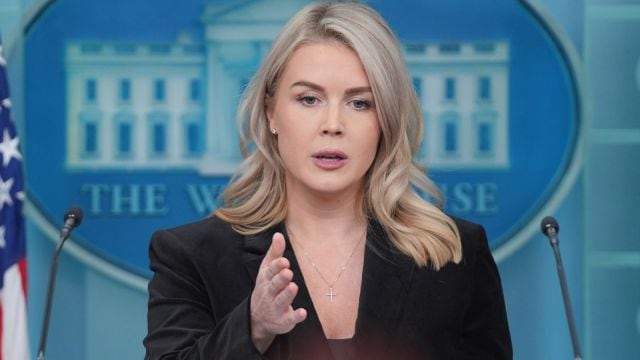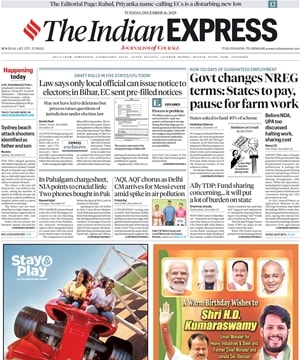‘He calls out fake news’: White House defends Trump after his ‘Quiet, piggy’ remark to reporter
Press secretary Karoline Leavitt claimed his directness was part of why Americans re-elected him.
 White House press secretary Karoline Leavitt speaks during a press briefing at the White House. (AP Photo)
White House press secretary Karoline Leavitt speaks during a press briefing at the White House. (AP Photo) The White House on Thursday defended President Donald Trump after he referred to a female journalist as “piggy” during a tense exchange about the Jeffrey Epstein case. Pressed about the president’s language, White House press secretary Karoline Leavitt claimed his directness was part of why Americans re-elected him.
“He calls out fake news when he sees it and gets frustrated with reporters who spread false information,” Leavitt said, according to Reuters. She offered no examples of what information had been false. She also argued that Trump provides “unprecedented access” to the press and answers questions regularly.
The incident occurred last week on Air Force One, when Catherine Lucey, a reporter for Bloomberg News, questioned Trump about newly released emails linked to Epstein. As she pressed him on whether the documents suggested he had prior knowledge of Epstein’s activities, Trump leaned toward her, pointed, and said: “Quiet, piggy.”
//www.instagram.com/embed.js
The clip later went viral, prompting condemnation from reporters and media advocates.
The controversy unfolded as Trump signed legislation requiring the Justice Department to release long-withheld documents from its Epstein investigation, after initially resisting making them public.
Other clashes with reporters this week
The Air Force One exchange was not isolated. On Tuesday in the Oval Office, Trump called ABC News reporter Mary Bruce “a terrible person” after she questioned Saudi Crown Prince Mohammed bin Salman about the killing of journalist Jamal Khashoggi and asked Trump why the Epstein files had not been released.
“It’s not the question that I mind. It’s your attitude,” Trump was quoted by The Guardian as telling her. “It’s the way you ask these questions.”
The Society of Professional Journalists condemned Trump’s language toward both Lucey and Bruce, saying the pattern of hostility, often directed at women, undermines press freedom. SPJ Executive Director Caroline Hendrie said: “Targeting women reporters with humiliating insults should not be tolerated.” She added that the behaviour has broader implications for global press rights.






